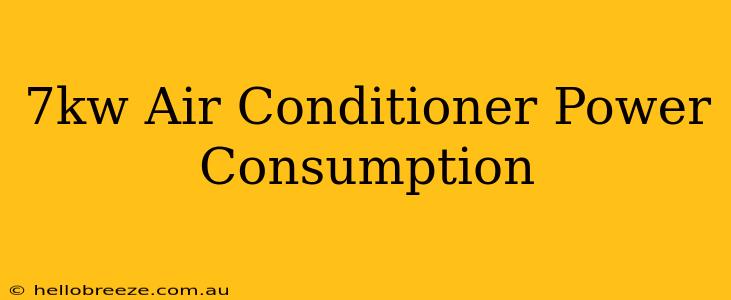Are you considering a 7kW air conditioner but concerned about its power consumption? Understanding your AC's energy usage is crucial for budgeting and environmental responsibility. This comprehensive guide will break down 7kW air conditioner power consumption, helping you make informed decisions.
Understanding 7kW Air Conditioner Power Consumption
A 7kW air conditioner signifies its cooling capacity, meaning it can remove 7 kilowatts of heat per hour. However, the actual power consumption is lower. This is because the energy efficiency of an air conditioner is measured by its Energy Efficiency Ratio (EER) or Seasonal Energy Efficiency Ratio (SEER). These ratios indicate how much cooling you get for each unit of electricity consumed.
EER vs. SEER: What's the Difference?
-
EER (Energy Efficiency Ratio): This measures the cooling output (in BTU/hour) divided by the energy input (in watts) under specific test conditions. A higher EER indicates greater efficiency.
-
SEER (Seasonal Energy Efficiency Ratio): This provides a more realistic picture of annual efficiency, considering varying weather conditions throughout the season. A higher SEER rating implies lower energy consumption over the entire cooling season.
The higher the EER and SEER ratings, the less electricity your 7kW air conditioner will consume. Always check the EER and SEER ratings before purchasing to compare different models.
Factors Affecting 7kW Air Conditioner Power Consumption
Several factors influence the actual energy used by your 7kW AC:
1. Climate and Ambient Temperature:
The hotter the outside temperature, the harder your air conditioner has to work, resulting in increased power consumption.
2. Insulation and Air Leaks:
A well-insulated home with minimal air leaks will require less energy to maintain a cool temperature. Poor insulation forces the AC to run longer and consume more electricity.
3. Usage Habits:
Setting the thermostat too low or leaving the AC running when you're away significantly increases energy usage.
4. Air Conditioner Maintenance:
Regular maintenance, including cleaning filters and coils, ensures optimal performance and reduces energy consumption. A dirty filter restricts airflow, forcing the compressor to work harder.
5. Air Conditioner Model and Features:
Different 7kW AC models have varying levels of efficiency due to differences in technology and design. Features like inverter technology can significantly reduce power consumption. Inverter technology allows the compressor to run at variable speeds, adjusting its output according to cooling needs. This results in more efficient operation and reduced energy bills compared to non-inverter models.
Calculating Approximate Energy Consumption
To estimate your 7kW air conditioner's power consumption, you need the EER or SEER rating. Let's assume an EER of 12. This means for every 1 kW of power consumed, the AC produces 12 kW of cooling. Therefore, the approximate power consumption of a 7kW AC with an EER of 12 would be around 0.58 kW (7kW / 12). This is an approximation, and actual consumption will vary.
Remember: This calculation is simplified. Actual power consumption is influenced by the factors mentioned above.
Tips for Reducing 7kW Air Conditioner Power Consumption
- Regular maintenance: Clean or replace air filters regularly.
- Proper insulation: Ensure your home is well-insulated.
- Seal air leaks: Caulk and weatherstrip windows and doors.
- Smart thermostat: Use a programmable or smart thermostat to optimize cooling schedules.
- Energy-efficient windows: Consider upgrading to energy-efficient windows.
- Strategic window coverings: Use curtains or blinds to block out sunlight.
- Efficient fans: Use ceiling fans or portable fans to supplement cooling.
By understanding your 7kW air conditioner's power consumption and implementing energy-saving strategies, you can enjoy comfortable cooling while minimizing your environmental impact and electricity bills. Always check the manufacturer's specifications and consult with an HVAC professional for personalized advice.

